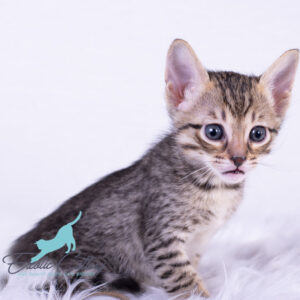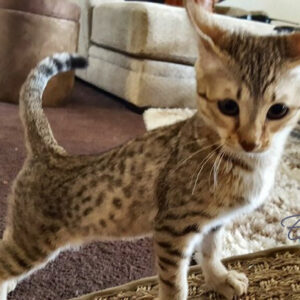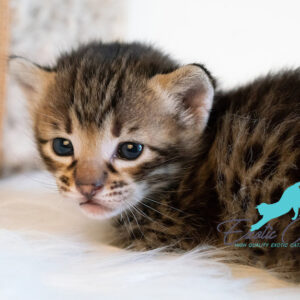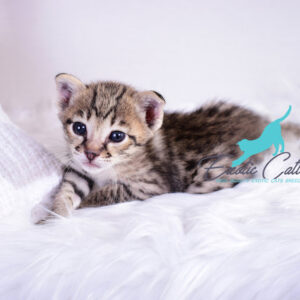Description
F1 Savannahs Cat for Sale UK | Understanding the F1 Savannah Cat Breed
Are you considering bringing a new furry friend into your family, and you’re thinking of getting an F1 Savannah Cat? If so, you’re probably wondering what makes this breed so unique and special. In this article, we’ll delve into the characteristics, size, lifespan, and temperament of the F1 Savannah Cat, as well as its history and origin.
What is an F1 Savannah Cat?
The F1 Savannah Cat is a hybrid breed, resulting from the cross between a Serval (a wild cat native to Africa) and a Domestic Cat. This unique combination gives the F1 Savannah Cat its distinctive appearance and characteristics. With its striking coat patterns and vibrant colors, the F1 Savannah Cat is a true showstopper. Exotic Cattery have the knowledge and experience to produce beautiful exotic cats. Browse our kittens available page. For photos of the new arrivals. New arrival of F1 Savannahs cat.
Characteristics of the F1 Savannah Cat
So, what can you expect from an F1 Savannah Cat? Here are some key characteristics to keep in mind:
| Characteristics | Description |
|---|---|
| Size | Medium to large, with males weighing up to 20 pounds |
| Coat | Short, smooth, and glossy, with a distinctive spotted or marbled pattern |
| Color | Ranges from golden to silver, with dark spots or marbling |
| Eyes | Large, almond-shaped, and golden in color |
| Personality | Confident, playful, and affectionate, with a strong prey drive |
The Personality of an F1 Savannahs Cat
Beyond the amazing look offered by the F1 Savannahs cat, the dog-like personality is another truly amazing characteristic. Who doesn’t like to be greeting with a face full of love and admiration when they return home from a long day at work? Now envision that face belonging to an F1 Savannah kitten that will give you head butts and purrs and will follow you from room to room for the rest of the evening. What happens when you get up from your show to grab a drink and the cat didn’t notice you leave? You will hear about it! The cat will start calling for you with their wild ‘chirp’ vocalization and start searching the house for you. Once they find you, you will see the look of relief fill their eyes and an expression that says “Oh yay you’re still home!”
History and Origin of the F1 Savannah Cat
The F1 Savannah Cat breed was first developed in the 1980s by breeding Serval males with Domestic Cat females. This unique combination was designed to create a cat that was both exotic and domesticated. Today, the F1 Savannah Cat is a popular breed among cat enthusiasts, prized for its striking appearance and playful personality.
Finding a Reputable Breeder or Seller in the UK
If you’re interested in bringing an F1 Savannah Cat into your family, it’s essential to find a reputable breeder or seller in the UK. Here are some tips to help you get started:
- Research local breeders and sellers online, and read reviews from other cat owners.
- Look for breeders and sellers who are registered with reputable organizations, such as the Governing Council of the Cat Fancy (GCCF).
- Ask plenty of questions about the cat’s health, temperament, and ancestry.
- Make sure the breeder or seller is transparent about the cat’s history and health status.
Getting in Touch with a Cat Rescue Organization or Rehoming Service
If you’re not ready to commit to buying a new cat, or if you’re looking for a more affordable option, consider reaching out to a cat rescue organization or rehoming service in the UK. Here are some options to consider:
- Cat Protection League: A UK-based charity that rescues and rehomes cats in need.
- RSPCA: The Royal Society for the Prevention of Cruelty to Animals, which also offers cat rehoming services.
- Local animal shelters: Many local animal shelters have cats available for adoption, including F1 Savannah Cats.
Caring for Your F1 Savannah Cat: Nutrition, Health, and Behavior
Nutrition for F1 Savannah Cats
As a responsible cat owner, it’s essential to provide your F1 Savannah Cat with a balanced and nutritious diet. Here are some tips to keep in mind:
- High-quality cat food: Feed your F1 Savannah Cat a high-quality cat food that’s rich in protein and low in carbohydrates.
- Fresh water: Ensure your cat always has access to fresh, clean water.
- Avoid overfeeding: F1 Savannah Cats are prone to obesity, so monitor your cat’s food intake and avoid overfeeding.
- Consider a raw diet: Some cat owners swear by a raw diet for their F1 Savannah Cats, but be sure to consult with a veterinarian before making any changes.
Health Issues in F1 Savannah Cats
Like all breeds, F1 Savannah Cats are prone to certain health issues. Here are some common health problems to watch out for:
| Health Issue | Description |
|---|---|
| Hypertrophic Cardiomyopathy | A heart condition that can lead to heart failure |
| Patellar Luxation | A condition where the kneecap slips out of place |
| Hip Dysplasia | A genetic condition that can lead to arthritis and mobility issues |
| Dental problems | Regular dental care is essential to prevent tartar buildup and gum disease |
Behavior and Training for F1 Savannah Cats
F1 Savannah Cats are known for their playful and affectionate personalities, but they can also be strong-willed and independent. Here are some tips for training and behavior:
- Positive reinforcement: Reward your cat with treats and praise for good behavior.
- Provide plenty of toys and stimulation: F1 Savannah Cats are natural hunters and need plenty of toys and stimulation to keep them entertained.
- Establish a routine: Establish a regular routine for feeding, playtime, and sleep to help your cat feel secure and relaxed.
- Consider clicker training: Clicker training can be an effective way to train your F1 Savannah Cat and strengthen your bond.
Adopting an F1 Savannah Cat: Tips and Considerations
If you’re considering adopting an F1 Savannah Cat, here are some tips and considerations to keep in mind:
- Research local breeders and sellers: Make sure you’re working with a reputable breeder or seller who prioritizes the health and well-being of their cats.
- Ask plenty of questions: Don’t be afraid to ask questions about the cat’s history, health, and temperament.
- Consider adopting an adult cat: Adult F1 Savannah Cats can make wonderful pets, and they may already be litter-trained and less energetic than kittens.
- Be prepared for the costs: F1 Savannah Cats can be expensive to purchase and maintain, so be sure to factor in the costs of food, vet care, and supplies.
Frequently Asked Questions
- Q: Are F1 Savannah Cats good with children? A: F1 Savannah Cats can be good with children if socialized properly, but they may not be suitable for very young children due to their strong prey drive.
- Q: Do F1 Savannah Cats require a lot of exercise? A: F1 Savannah Cats are naturally active and require plenty of exercise and stimulation to prevent boredom and obesity.
- Q: Can I get an F1 Savannah Cat if I have a small living space? A: F1 Savannah Cats require plenty of space to roam and exercise, so a small living space may not be suitable for this breed.
F1 Savannahs Cat
Have you wondered what it would be like to share your home with a Savannah cat and more specifically an F1 Savannah Cat?
The F1 Savannah Cat is Extreme
F1 Savannah cats are, in one word, EXTREME in every sense of the word. Extreme in their wild look, color, body type, intelligence, athleticism, energy level and overall wow-factor. In general, the F1 Savannah kitten is the largest of all Savannahs. With the greatest amount of Serval ancestry, the F1 Savannahs cat most closely resembles its wild African Serval father. Like the Serval, they maintain the extreme leg length, svelte body physique and regal head and ears that sit atop a neck whose length is extreme in itself. F1’s can have between 50 and 75% Serval blood in them, while most will have 50-60%.
read more :










